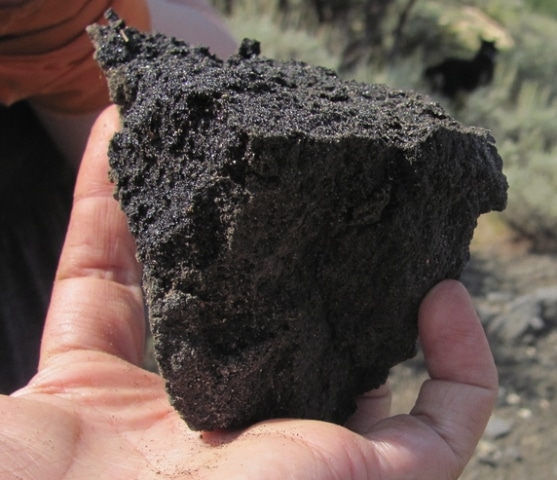U.S. Oil Sands and MCW Enterprises, move over.
Yet another company is poised to start grinding up and spitting out eastern Utah’s wilderness for its tar sands.
Until now, the biggest threat to eastern Utah’s wilderness has been the Canadian company U.S. Oil Sands, which amid protests in 2013 succeeded in starting a strip mining operation for tar sands at PR Spring, in eastern Utah’s Bookcliffs range, about 35 miles west of the Colorado border.
In what’s shaping up to be a new rush to riches by producing dirty oil from unconventional sources in the western U.S., now another company, American Sands Energy Corporation (ASEC), has obtained the rights to mine tar sands and bitumen (asphalt) on 1,800 acres of private property in an area called Sunnyside, about 150 miles southeast of Salt Lake City.
The company calls the project the “Sunnyside Project” or the “Gibbs Project,” after the Gibbs family, which owned the property 30 years ago. William Gibbs is the chairman of the board and CEO of American Sands Energy Corporation.
ASEC couldn’t possibly have found a friendlier place in the U.S. for its fossil fuel extraction project.
Sunnyside, population 274 in 2012, is a former coal town in Carbon County, and is so friendly to energy interests that up until 1994, it never had an elected mayor. Before that time, the town’s mayor was the superintendent of mines for the Utah Fuel Coal Company. After Kaiser Steel took over the local mines in 1950, Sunnyside’s mayor was the head of Kaiser Steel.
Sunnyside’s citizens have long depended on extractive energy interests to put meals on the table. After the coal companies left, the Chevron Corporation leased the Sunnyside property in the 1980s, but pulled out after government subsidies for its activities ended. Then Amoco took over the leases and continued mining and energy development until the price of oil collapsed in the 1990s. ASEC was the next company to acquire leases on the property, in 2005 and 2009. In its investor materials, ASEC boasts (pdf) that “Utah is ranked 2nd in the U.S. and 9th in the world for best places for mining operations.”
“Environmentally friendly” strip mining
Like U.S. Oil Sands, ASEC claims to have a new, environmentally friendly process (pdf) for extracting tar sands. According to the company’s promotional materials, mined tar sands are first mixed with a “proprietary solvent,” which liquifies the bitumen contained in the sand and rock. The bitumen/solvent mixture is then separated from the sand and rock, then heated to separate out the solvent from the bitumen. The resulting bitumen will then be trucked or shipped by rail 150 miles to a refinery in Salt Lake City.
ASEC does not publicly reveal the chemical makeup of its proprietary solvent and claims its process has “no associated environmental hazards.” Despite the fact strip mining is necessary to access the tar sands, ASEC says its project is “environmentally benign.”
ASEC claims a cost advantage over Canadian Athabasca tar sands due to the lower sulfur and water content of its source material, and a production location near to key infrastructure, such as paved roads and refineries.
Like U.S. Oil Sands, ASEC constructed pilot plants for its tar sands mining process in Sunnyside, and on Asphalt Ridge, in 2013.
ASEC further claims its process uses no water, produces no emissions and leaves no tailings ponds. The company says it expects to have a $50/barrel “break even” price. It plans to have a 5,000 barrel per day facility fully operational in 2014, and tells investors it plans are to ramp up production to 50,000 barrels per day.
The rush to exploit Utah’s tar sands is shaping up to be a modern-age gold rush, happening at virtually the same time as the Intergovernmental Panel on Climate Change issued its 2014 report saying the world must make a massive effort to cut use of dirty fossil fuels and urgently triple its output of clean, renewable energy, such as solar and wind, by 2050 to have any hope of avoiding catastrophic climate change.
Photo credit: “US Tar Sands exploratory mission” by BeforeItStarts
Subscribe to our newsletter
Stay up to date with DeSmog news and alerts






